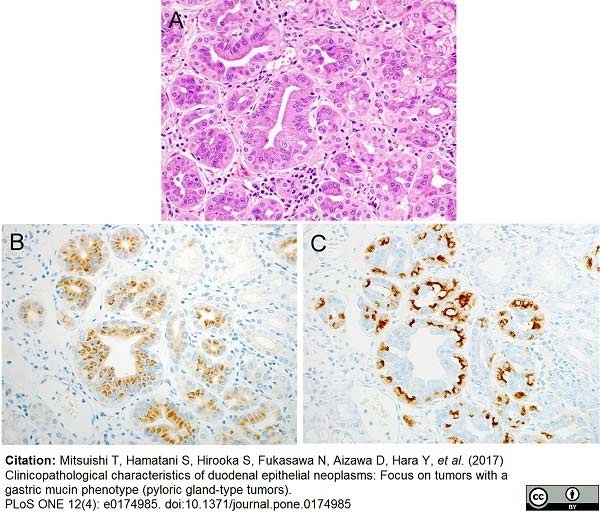Pepsinogen I antibody | 8003 (99/12)

Mouse anti Human Pepsinogen I
- Product Type
- Monoclonal Antibody
- Clone
- 8003 (99/12)
- Isotype
- IgG1
- Specificity
- Pepsinogen I
| Mouse anti Human pepsinogen 1 antibody, clone 8003 recognizes human Pepsinogen I, a zymogen or proenzyme secreted by chief cells in the stomach. It is cleaved to form pepsin both in an autocatalytic fashion and by pepsin itself. In humans there are two related forms of pepsin, Pepsinogen I (also known as pepsinogen A), and Pepsinogen II (also known as Pepsinogen B or progastricsin). Mouse anti Human pepsinogen 1 antibody, clone 8003 has an affinity of 4 x 1010 l/mol human Pepsinogen I. |
- Target Species
- Human
- Product Form
- Purified IgG - liquid
- Preparation
- Purified IgG prepared by affinity chromatography on Protein A from tissue culture supernatant
- Buffer Solution
- Phosphate buffered saline
- Preservative Stabilisers
- <0.1% Sodium Azide (NaN3)
- Immunogen
- Purified human pepsinogen 1.
- Approx. Protein Concentrations
- IgG concentration 0.5 mg/ml
- Regulatory
- For research purposes only
- Guarantee
- 12 months from date of despatch
Avoid repeated freezing and thawing as this may denature the antibody. Storage in frost-free freezers is not recommended.
| Application Name | Verified | Min Dilution | Max Dilution |
|---|---|---|---|
| ELISA | |||
| Immunohistology - Paraffin 1 | |||
| Radioimmunoassays |
- 1*This product requires antigen retrieval using heat treatment prior to staining of paraffin sections.Sodium citrate buffer pH 6.0 is recommended for this purpose.
References for Pepsinogen I antibody
-
Genta, R.M. & Pusztaszeri, M. (2006) The gastric mucosa in gastric cancer patients in a low-incidence area.
Eur J Gastroenterol Hepatol. 18 (10): 1085-93. -
Ueyama, H. et al. (2010) Gastric adenocarcinoma of fundic gland type (chief cell predominant type): proposal for a new entity of gastric adenocarcinoma.
Am J Surg Pathol. 34: 609-19. -
Sakamoto, H. et al. (2011) Cell lineage dynamics in the process leading to intestinal metaplasia.
J Gastroenterol. 46: 620-8. -
Hidaka, Y. et al. (2013) Alteration in the Wnt/β-catenin signaling pathway in gastric neoplasias of fundic gland (chief cell predominant) type
Hum Pathol. 44: 2438-48. -
Nakajima, T. et al. (2016) Distribution of Lgr5-positive cancer cells in intramucosal gastric signet-ring cell carcinoma.
Pathol Int. 66 (9): 518-23. -
Chiba, T. et al. (2016) Clinicopathological features of gastric adenocarcinoma of the fundic gland (chief cell predominant type) by retrospective and prospective analyses of endoscopic findings.
Dig Endosc. 28 (7): 722-30. -
Mamat, O. et al. (2016) Fundic gland differentiation of oncocytic/pancreatobiliary subtypes of pancreatic intraductal papillary mucinous neoplasm.
Histopathology. 69 (4): 570-81. -
Fujita, Y. et al. (2016) Incidence of lymphatic involvement in differentiated-type intramucosal gastric cancers as examined by endoscopic resection.
Gastric Cancer. 19 (1): 192-7.
View The Latest Product References
-
Mitsuishi, T. et al. (2017) Clinicopathological characteristics of duodenal epithelial neoplasms: Focus on tumors with a gastric mucin phenotype (pyloric gland-type tumors).
PLoS One. 12 (4): e0174985.
- Synonyms
- PG I
- RRID
- AB_2160770
7240-1009
If you cannot find the batch/lot you are looking for please contact our technical support team for assistance.
Please Note: All Products are "FOR RESEARCH PURPOSES ONLY"
View all Anti-Human ProductsAlways be the first to know.
When we launch new products and resources to help you achieve more in the lab.
Yes, sign me up